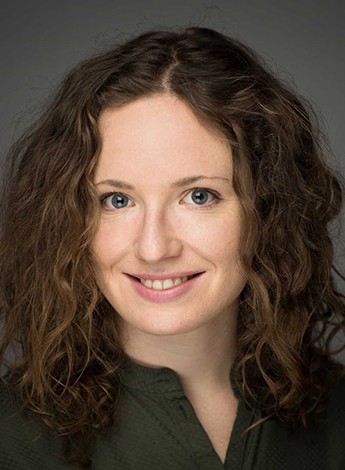
ACL fact versus fiction

VIC EVENT Dr Stephanie Filbay’s research has found that current management of anterior cruciate ligament injury in Australia is not evidence-based and that anterior cruciate ligament ruptures can heal without surgery.
‘Our study found that a majority of patients who present with acute ACL rupture don’t receive information about management options that reflects the evidence.
My presentation will break down the information provided by each healthcare profession involved in the management of ACL injury, including physiotherapists, orthopaedic surgeons, sports and exercise physicians and GPs.’
The role and responsibilities of physiotherapists in the management of anterior cruciate ligament (ACL) injuries will be in the spotlight when Dr Stephanie Filbay APAM delivers her keynote speech at the 2023 Victorian Branch End of Year Breakfast on 24 November.
Stephanie’s research aims to reduce the burden of knee injury and post- traumatic knee osteoarthritis. Her presentation—‘ACL injury management in Australia is not evidence based: empowering physiotherapists to transform current practice’—will critically appraise the latest research comparing surgical and non-surgical management of ACL injury and will challenge common beliefs and assumptions.

The physiotherapist, National Health and Medical Research Council Fellow and Dame Kate Campbell Fellow is a senior research associate and co-leads the musculoskeletal and sports medicine stream in the Centre for Health, Exercise and Sports Medicine at the University of Melbourne.
In 2021, she was awarded a National Health and Medical Research Council Investigator Grant to fund five years of research, enabling her team to evaluate a novel non- surgical intervention to facilitate healing
of ACL rupture and to develop a patient decision aid for ACL injury management.
Stephanie has led two national surveys and two qualitative studies in order to understand current management of ACL injury in Australia, with more than 1000 patients and physiotherapists.
The study identified reasons for the over-utilisation of ACL surgery and barriers to non-surgical management.
‘We wanted to know what currently goes on in terms of ACL injury management, treatment and decision-making.
'What are patients told by physios, by sports doctors and by surgeons?
'Do physios face any barriers to delivering non-surgical treatment or evidence-based care?’
The researcher says that such details are vital to patients making an informed decision on treatment for their ACL injury.
For example, only 29 per cent of physiotherapists and 10 per cent of surgeons advised patients that outcomes are similar on average following either ACL reconstruction or initial management with rehabilitation; 65 per cent of physiotherapists and 87 per cent of surgeons presented ACL reconstruction as the best treatment option for the patient.
The findings, Stephanie says, do not align with clinical trial and systematic review evidence demonstrating that outcomes are similar between treatment options and that rehabilitation is recommended as the first-line treatment for acute ACL rupture in most cases.
‘There are potential implications of these findings.
'About 90 per cent of people undergo ACL reconstructive surgery in Australia despite clinical trials demonstrating that ACL surgery does not improve outcomes compared to rehabilitation alone and that surgery is not cost-effective.
'Physio-based rehab should be considered as the first-line treatment, with surgery then considered if the
patient doesn’t achieve the desired knee function.
'I will also present key reasons for the low uptake of non-surgical management of ACL injury in Australia and give an overview of evidence-based recommendations for the management of ACL injury.’
‘This presentation will give physiotherapists guidance on how to provide patients with an evidence-
based, balanced overview of ACL injury treatment options so they can make an informed treatment decision that aligns with their preferences and values.’
Her team is in the final stages of developing a free online patient decision aid for ACL injury management and producing a free e-learning course to help physiotherapists upskill in the management of ACL injury.
Stephanie is also investigating the potential for healing of ACL rupture and outcomes following management with the novel Cross Bracing Protocol.
These studies have recently been published in the British Journal of Sports Medicine.
Physio-based rehab should be considered as the first-line treatment, with surgery then considered if the patient doesn’t achieve the desired knee function. STEPHANIE FILBAY
The first study analysed data from the KANON clinical trial and found that at least 30 per cent of people with ACL rupture who were managed with initial rehabilitation had signs of ACL healing (a continuous ACL) on two-year MRI.
Those with ACL healing reported better two-year outcomes than people randomised to early ACL reconstruction.
The second study evaluated outcomes following the use of the Cross Bracing Protocol, which aims to facilitate ACL healing, and found that 90 per cent of people had signs of healing on MRI three months after ACL rupture.
More signs of healing on MRI were associated with better 12-month patient- reported outcomes.
Stephanie will present these findings and discuss the potential implications of ACL healing for physiotherapists.
Before joining the University of Melbourne in 2020, the La Trobe University graduate spent four years as a senior research associate in orthopaedics, rheumatology and musculoskeletal science at the University of Oxford.
She was awarded a PhD by the University of Queensland in 2016.
In terms of research in the field, Stephanie is recognised internationally for promoting evidence-based management of ACL injury and developing strategies to improve outcomes for patients.
Stephanie is ranked second highest in the UK and third highest in Australia for ACL research.
She chairs and serves on international boards and committees and has supervised 30 individuals at various career stages as well as receiving numerous awards, scholarships and grants for her research.
She has presented her research in over 100 keynote and other invited addresses in more than 10 countries.
‘Given that around 50 per cent of people develop knee osteoarthritis within 10 years of ACL injury, this research has real-world impact in its potential to reduce the personal and societal burden of ACL injury and knee osteoarthritis.’
The Victorian Branch End of Year Breakfast will be held in Richmond, Victoria, on Friday 24 November, 6.30–9.30 am.
Click here for more information and to book
© Copyright 2025 by Australian Physiotherapy Association. All rights reserved.





